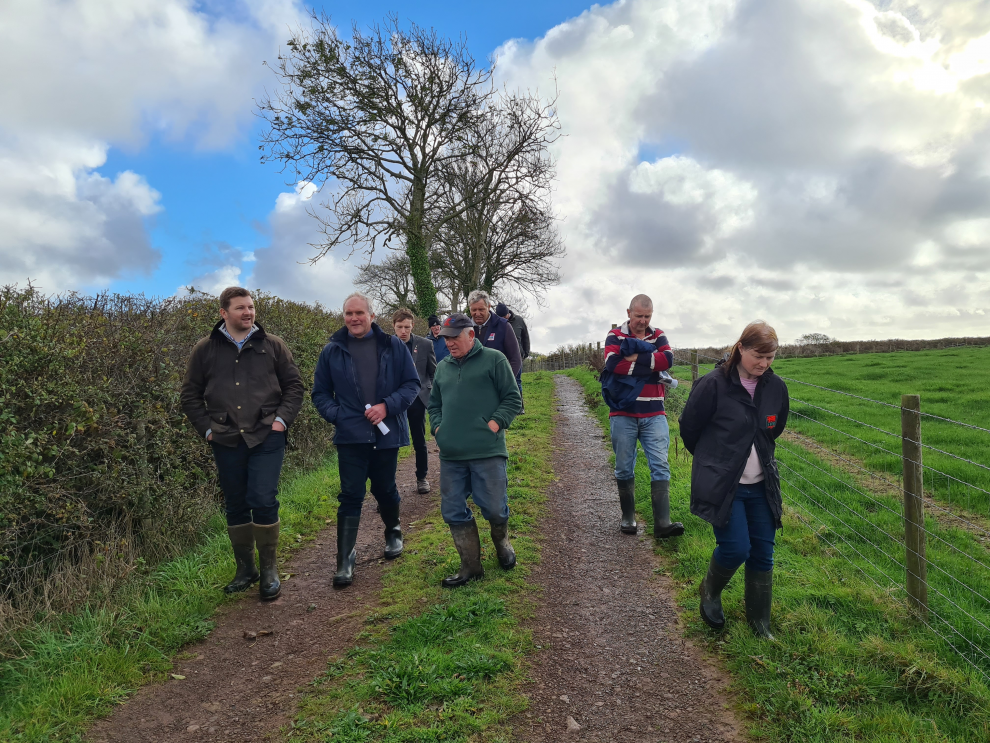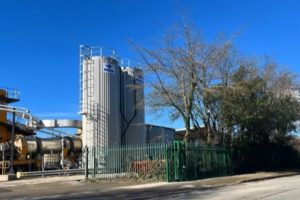A Pembrokeshire tenant farmer has raised concern regarding the Agricultural Water Pollution regulations, the Sustainable Farming Scheme and wider farming matters with local Member of the Senedd, Sam Kurtz.

Tony Cadogan, who farms at New Shipping Farm, Cresselly, Kilgetty, Pembrokeshire, keeps a herd of 50 Hereford suckler cows plus followers. Farming 132 hectares which he manages as 56.5 hectares of arable and 53 hectares of grass along with grazed saltmarsh and woodland.
The land is split over three blocks, with the two main blocks being registered as organic, which are also in the Glastir Advanced and Glastir Organic schemes. Mr Cadogan is a big believer in farming to the benefit of the environment around him and the abundance of wildlife on the farm bears testament to this and the hard work which he has undertaken since taking on the tenancy of the farm in 2001.
Speaking about the Water Resources Regulations, Mr Cadogan said:
“We have received funding under the Farm Business Grant Yard Covering Scheme to undertake work to help comply with the new Agricultural Water Resources regulations, however, the regulations must be amended in order to tackle agricultural pollution effectively.
“The latest announcement on the Water Resources (Control of Agricultural Pollution) (Wales) Regulations, which sets out intentions to delay the implementation of the annual whole farm nitrogen limit of 170kg per hectare and consult on a licensing scheme to increase that limit, is of course a welcome opportunity to influence change.”
FUW Pembrokeshire County Executive Officer Rebecca Voyle said:
“The proposed licensing regime would serve as a significant safety net for a number of farmers in Wales in the short term who are already above the 170kg limit. This is especially important where reducing stock numbers or buying or renting additional land are not viable options, and compliance with the 170kg limit will breach contracts or tenancy agreements, or compromise the ability to repay loans.
“However, this is just one regulation out of forty-six set out in this piece of legislation and therefore we must consider the long term implications of these regulations as a whole for our members.”
Addressing the Sustainable Farming Scheme proposals, Mr Kurtz heard that the FUW welcomed the commitment to a baseline payment for all farmers, providing much needed stability for food producing family farms.
FUW Pembrokeshire County Vice Chair Gerwyn Williams said:
“The FUW believes the majority of the budget should be used to provide this stability payment in return for the new Universal Actions required of farmers on top of the ‘National Minimum Standards’.
“There are also still concerns about the impact of budget cuts from Westminster and the size of the budget after 2023, particularly as the proposals are ambitious, covering a wide range of objectives at a time when farmers are experiencing a significant increase in costs.”
Union officials added that the proposal to use RPW Online as the main tool for farmers themselves to undertake a simplified Sustainability Review is welcome, as it recognises the value of existing data collection by farmers, the capability and user-friendliness of the current system, and the expense of using advisors to conduct the review on farm as was previously proposed.

“However, it is highly disappointing that the outcomes required of the scheme – based around the principles of Sustainable Land Management such as Clean air, Resilient ecosystems and Enhanced Access – still do not incorporate the economic sustainability of family farms, agricultural supply chains, rural communities or food production explicitly.
“Without such objectives being central to the scheme there is a risk of economic damage, particularly if the calculation of baseline payment rates doesn’t take such economic support into account,” added FUW Senior Policy and Communications Officer Gareth Parry.
Mr Parry further stressed that many of the Universal Actions would be wholly impractical for large numbers of farmers and therefore require greater consideration.
“There is a requirement in the proposals which calls for every farm to have at least 10 percent tree cover before being able to access the scheme. For farmers who are tenants, have a vast amount of habitat land or designations unsuitable for planting, or who farm in areas where trees will not grow, this would be difficult or impossible.
“The proposal would also be extremely challenging for highly productive farms, particularly given the current strain on food security.”
Sam Kurtz also heard that whilst the recent document is not consulting on the National Minimum Standards explicitly, the scheme will be underpinned by that legislative framework, and therefore consideration must be given to ensuring a raised regulatory baseline does not lead to a competitive disadvantage for Wales’ farmers as they compete with imports produced to lower environmental and animal welfare standards.


















